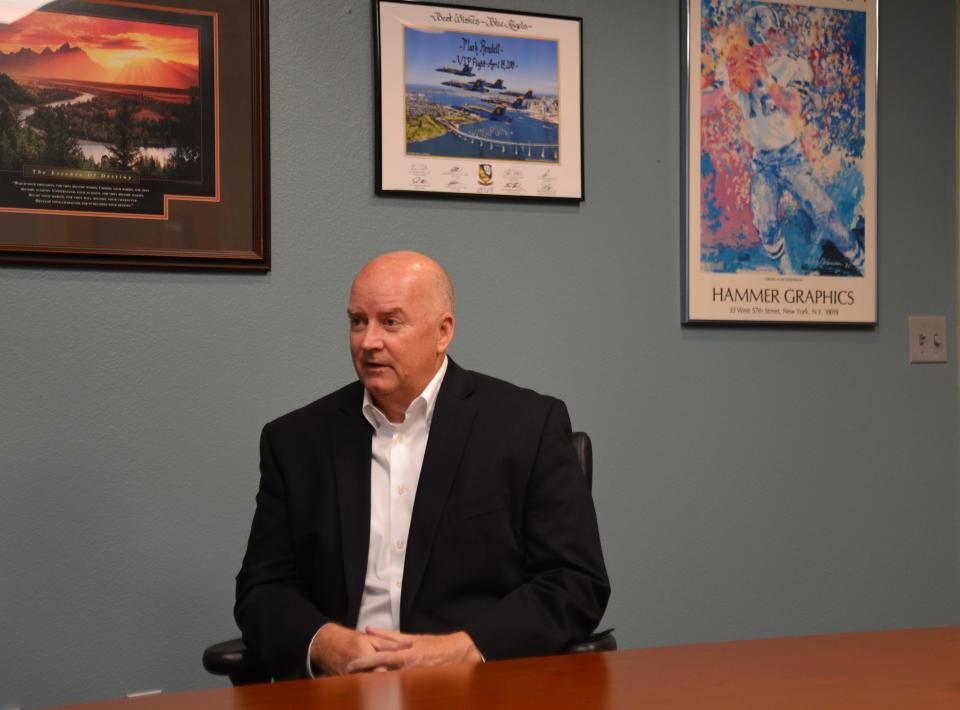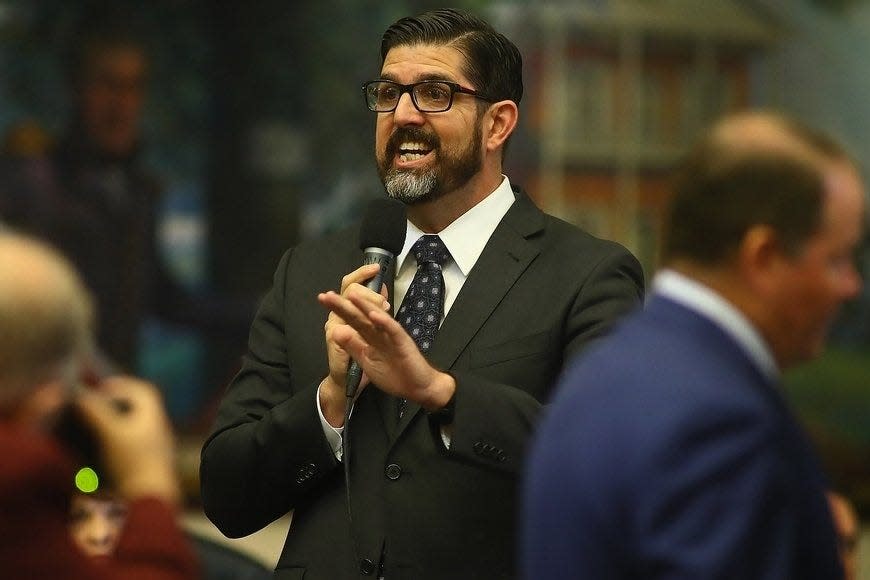Florida Department of Education says districts can teach AP Psych. Does law say otherwise?
This week was supposed to mark the kickoff of Sandy Edwards’ 18th year as an AP Psychology teacher at Bayside High School in Palm Bay.
But on Monday, as she set up her classroom, she worked to shift gears entirely.
Only a few days prior, on Aug. 3, the Florida Department of Education had essentially banned the teaching of AP Psychology throughout the state. The following day, they seemingly reversed the decision, with the caveat that educators must teach the course in an “age appropriate” manner. Because the course includes information on gender identity and sexuality, topics restricted under House Bill 1069, it’s unclear whether that’s even possible.
In Brevard, Superintendent Mark Rendell isn’t risking it. In two emails sent over the weekend to school board members, he cited concerns about legal repercussions against teachers.
“As I stated before, if a teacher teaches all elements of the course, they will violate the law,” Rendell wrote in an email Saturday morning. “If they do not teach all elements of the course the students lose the AP certification. I will not put either (our) students or staff in this position.”
There were previously 12 schools offering the course in Brevard, according to the district.

Department of Education flips: AP Psychology could be back on students' schedules in Florida as DOE clarifies guidance
Discipline, new laws, board actions: Brevard parents and teachers share concerns ahead of new school year
Edwards said there were “rumblings” of a decision earlier last week, but she still felt blindsided when she found out she would no longer be teaching the course and would instead be teaching only standard psychology and sociology.
“To just, days before school starts, say, ‘No, we’re not going to offer that anymore’ — it’s political, it doesn’t need to be an issue (in) the classroom and I’m very embarrassed about being a Floridian right now,” she said. “It’s humiliating, over something that’s such a small part of the curriculum.”
The contested part of the curriculum generally takes up a small portion of only one lesson and consists of defining terms like “sexual orientation” and “gender identity,” she said.
“The stuff that they’re talking about is so minuscule,” Edwards said. “It’s barely a 15-minute conversation. I just define those terms.”
The College Board clarified in a news release Thursday that the course asks students to “describe how sex and gender influence socialization and other aspects of development,” adding that gender and sexual orientation have been part of the course since it launched 30 years ago.
Rendell isn’t the only one concerned about the legality of teaching the course. Multiple organizations are seeking clarity from FLDOE after Commissioner Manny Diaz Jr. said Friday that schools may teach the course in its entirety as long as they do so in an “age appropriate manner.”
What’s considered age appropriate, and thus won’t break Florida statute, however, is murky. HB 1069 and FLDOE guidelines prohibit the discussion of gender or sexuality in a classroom setting, save for high school, where teachers may only discuss the topics if required by state academic standards or as part of a reproductive health lesson. It’s not clear if the AP Psychology course falls under those guidelines.
The Florida PTA, a child advocacy group, asked for further clarification on Monday, with President Carolyn Nelson-Goedert writing that there has been continued “school district, parent and student confusion” regarding FLDOE’s guidance.
“We call upon the Florida Legislature to amend all statutes that censor course content based on arbitrary and subjective criteria, or that allow others than a student’s parents to limit their access to a full, rich and thought-provoking curriculum,” she wrote.
The letter to Diaz urged him to explicitly state a number of points, including that districts may provide the course in its entirety — including the section on gender identity and sexual orientation — without AP Psychology instructors, administrators or school board members facing repercussions. Nelson-Goedert reaffirmed that the decision to decide what is age appropriate should be made by a parent for their child.
The Florida Education Association, the largest labor union in the Southeast, also sought clarity on the guidelines, with President Andrew Spar writing that FLDOE’s statement still left questions answered.
“We call on you to clearly and unambiguously state that nothing in the AP Psychology course violates Florida statutes or Florida State Board of Education rule,” he wrote in the letter to Diaz Saturday. “Districts, parents, students and teachers need to know AP Psychology can be offered in Florida’s public schools in its entirety without any modifications, just as it has for deceased, and be in compliance with the law.”
He added that the organization has instructed every educator who has reached out to teach it “fully, faithfully and without fear of reprisal,” and asked Diaz to notify him in writing if that advice was inaccurate.

Board of Medicine: Permanent rules on transgender health to be made by end of year, Board of Medicine says
Brevard teachers get pay bump: Millage goes toward Brevard Public Schools employee compensation, student programs
Both Edwards and Caryn Weber, mom to a sophomore, said there’s been intense confusion for teachers and parents over the past few days.
Weber, whose son signed up to take the course at the end of last year, said she reached out to his guidance counselor over the weekend, but didn’t hear from his school until Monday.
“(They’re) saying that they’re trying to work with the district to get the course, but if (we) want to make arrangements for something else, here’s who to contact,” she said.
What her son's other options may be aren’t totally clear.
“I’m sure he could pick any other random class, but could he do dual enrollment, could he take psychology through dual enrollment?” Weber said. “We just are not sure.”
On Monday morning, Edwards went into her classroom with the hopes that perhaps Rendell would change his mind and allow the course to be taught. Though for now it seems like an impossibility, she's still holding out a little bit of hope.
“If they do change their mind, I will be happy, but it will be like, ‘Come on — do it or don’t do it,’” she said. “Something could change, but at this point, as of this afternoon, my admin has been talking to me, and we are having to switch people over to different subjects.”
Finch Walker is the education reporter at FLORIDA TODAY. Contact Walker at 321-290-4744 or [email protected]. Twitter: @_finchwalker.
This article originally appeared on Florida Today: Brevard schools, others unsure if AP Psychology meets law in Florida
